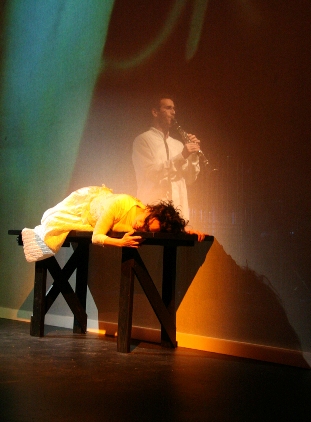
Jewish Community Center, Final Performance Today @ 2 p.m.
By JOHN DeMERS
Described as a “multi-media chamber opera” by Israeli-born composer Ofer Ben-Amots, The Dybbuk is dark, lyrical and occasionally luminous. Though not the world premiere, the two performances given as part of the JCC’s 37th annual Jewish Book & Arts Fair do give many in the audience their first opportunity to hear “opera” done more intimately than they’re used to – not to mention hearing arias sung in Hebrew, with the supertitles that more regularly help us get through Italian or French.
Based on the opera’s context, a “dybbuk” is a kind of restless spirit who wanders the earth after death. In this case, it’s the spirit of a young man prohibited from marrying his true love because she is rich and he happens to be poor. So his spirit does the next best thing, more or less possessing her after his body is in the grave, apparently with her approval. This possession draws the Rabbi to attempt a Jewish exorcism (remarkably similar in theology to the Christian versions we’ve seen in good and not-so-good horror movies). But in the end – after his/her refusal to depart – it leaves the couple together for eternity.
Those are the bare bones of the story; and once a too-static, talky first half has given way to the dramatic exorcism in the second, The Dybbuk puts some flesh on them – so to speak. Ben-Amots’ music is modern, sometimes atonal and, by definition, minimalist. What might find it a larger audience than such music often finds is its strong reference points in Jewish (meaning Eastern European) folk melody. Even a listener whose only references are Fiddler on the Roof and the score from Exodus will find lovely, faintly familiar touches. A wild array of sounds is served up by only Susan Grace on piano, Brittany Henry on violin and David Mollenaur on cello, with the composer himself handling some intriguing bits of percussion.
Well, instrumentally that’s not entirely true. Gilad Harel, tall, lanky, and called “Clarinet (as Hannan),” portrays the actual dybbuk of the title. This means that instead of speaking or singing, he expresses all the feelings in his heart on a clarinet – an interesting new visual for a leading man to be sure, especially if we forget Steve Allen in The Benny Goodman Story. This is how Hannan calls out to his love, played and sung here by lovely Houston mezzo soprano Misha Penton. This is the way he calls her to join him between life and death. Penton sings the lion’s share of Ben-Amots’ arias, lovely risings and fallings of nature poetry, with smoldering flair. And she evens gets to “be” her lover in the opera’s second half, when his spirits tells the rabbi through her to go take a hike.
The production’s stage director, Jeremy Wilhelm, fills out the cast as the Messenger and later the Rabbi – both interesting roles made believable by his natural acting style. Though the first half is too slow, Wilhelm keeps that viable by telling stories of love from the past (young lovers, Cossacks, a 17th-century pogrom) that he makes us want to hear. Still, it’s in the post-intermission that, as the Rabbi, he joins Penton in creating the conflict, tension and, yes, even a little suspense, The Dybbuk has needed all along.
This opera has one more star than the ones we get to watch act or hear sing: Sheri Wills. The entire performance is played out on either side of two scrims that showcase an amazing collection of videos and stills, virtually the entire set except for one table that gets pushed around a lot. Sometimes it’s abstract light or color that fills these scrims – sometimes with the lovers separated on either side, meaningfully – sometimes its dramatic forms, and sometimes it’s highly representational: trees in a forest here or, naturally, an ancient-looking Jewish graveyard there. Especially in the opera’s early going, when there is so little action, what happens on the scrims is what keeps our eyes arrested.
Finally, once we understand that the exorcism has been a failure (perhaps because neither Leah nor Hannan and his clarinet wish to be parted), Ben-Amots gives his timeless lovers the most gorgeous love duet we’ve heard in a while – all the more so because it’s Girl-Meets-Clarinet. The harmonics are beautiful yet also ear-catching, with barely a gesture required from the players to tell us what’s being said. With each lovely line echoed by the orchestra in what feels like the universe’s “call and response,” the duet starts out merely ascendant but kicks into transcendent by the end.
Photo by Dave Nickerson: Misha Penton with the spirit of her love
Leave a comment